North Carolina War Between the States Sesquicentennial Commission
Acts of Treason Against North Carolina
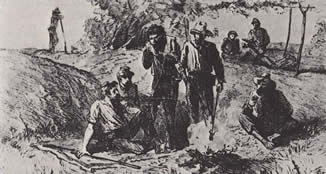
The question of loyalty to North Carolina is a seldom-discussed aspect of the War Between the States,
but an important topic nonetheless. Why did some North Carolinians choose to take the enemy’s side and
fight against their native State? Had North Carolina been victorious in the War Between the States, would it
have treated the “Buffaloes and renegades” as it did the Tories after the Revolution?
When the Northern fleet appeared off Hatteras in the fall of 1861, it was clear that the Lincoln administration
in Washington intended to invade North Carolina, and Lincoln's later appointment of former North Carolina resident
Edward Stanly as "governor" made it clear that the freely-elected government of North Carolina was to be overthrown
and replaced with one satisfactory to the North, not the people of North Carolina. Those levying war against North Carolina,
who adhered to and gave aid and comfort to the enemy, committed treason.
Definitions:
Traitor:
One who betrays his allegiance and betrays his country; one guilty of treason; one who, in breach
of trust, delivers his country to its enemy, or any fort or place entrusted to its defense, or who surrenders an army
or body of troops to the enemy, unless when vanquished; or who takes arms and levies war against his country;
or one who aids an enemy in conquering his country.”
(Webster’s Dictionary, 1828)
Treason:
“The action of betraying a trust; A violation by a subject of allegiance to the sovereign or to the State,
esp. by attempting or plotting to kill or overthrow the sovereign or overthrow the Government.”
(Oxford English Dictionary)
“Article 3, Section 3 of the U.S. Constitution defines treason as “only” levying war upon
the United States, or giving aid and comfort to their enemies. The “United States” is in the
plural, signifying free and independent States that are united in a cause. The word “their” is most
important because it also signifies that treason is defined only as levying war upon “them” – the free and
independent States, not something called “the United States government.”
This of course is precisely what Lincoln did when he levied war upon the Southern States.”
Dr. Thomas L. DiLorenzo, Loyola College
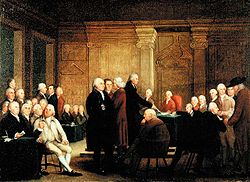
British and Colonial Origins of Treason Law
“The constitutional and legal foundation for the crime of treason was laid nearly 700 years ago
in the English statute of 25 Edward III (A.D. 1350).
{Among the] seven categories of “High Treason” in the Statute of Edward was that of “adhering”
to the King’s “enemies,” giving them “aid and comfort.” Although the provision endured throughout
the centuries in England, it is with the . . . colonial experience that its relevance [to America begins].
At one point or another, recognition of the crime of treason existed in most of the colonies, either
in express legislation or less formally. [The] first significant building block in the creation of the
modern American crime of treason came shortly after the Declaration of Independence. The Continental
Congress had formed the improbably named “Committee on Spies,” whose members included John Adams,
Thomas Jefferson, Robert Livingston, John Rutledge and James Wilson – all titans of the Revolution.
The Committee recommended that the colonies enact treason legislation, and Congress adopted the
recommendation, passed it on to the colonies, and, in doing so, utilized the then-familiar
language of the Statute of Edward:
“Resolved, That all persons abiding within any of the United Colonies, and deriving protection
from the laws of the same, owe allegiance to the said laws, and are members of such colony;
and that all persons passing through, visiting or make a temporary stay in any of the said colonies,
being entitled to the protection of the laws during the time of such passage, visitation,
or temporary stay, owe, during the same time, allegiance thereto:
That all persons, members of, or owing allegiance to any of the United Colonies, as before
described, who shall levy war against any of the said colonies within the same, or be adherent
to the King of Great Britain, or other enemies of the said colonies, or any of them, within the
same, giving to him or them, aid and comfort, are guilty of treason against such colony:
That it be recommended to the legislatures of the several United Colonies, to pass laws for punishing,
in such manner as to them shall seem fit, such persons before described, as shall be provably
attained of open deed, by people of their condition, of any of the treasons before described.”
Within a year, most of the former colonies, then members of the “United States,” had enacted
appropriate legislation using the Committee’s and the Congress’ recommended language.
Thus, at the birth of the Constitution of the United States of America in 1787, there was a
400-year-old acceptance of the idea that it was treason to “adhere” to a [Colony or State]
government’s “enemies” and give them “aid and comfort.”
(Aid and Comfort, Jane Fonda in Vietnam, Holzer & Holzer, McFarland & Company, 2002, pp. 95-96)
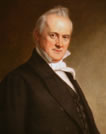
Buchanan Knew the Limits of Presidential Authority
“Mr. [James] Buchanan, the last President of the old school, would as soon have thought of aiding
the establishment of a monarchy among us as of accepting the doctrine of coercing the States into
submission to the will of a majority, in mass, of the people of the United States.
When discussing the question of withdrawing the troops from the port of Charleston, he yielded a ready
assent to the proposition that the cession of a site for a fort, for purposes of public defense, lapses,
whenever that fort should be employed by the grantee against the State by which the cession was made . . .
[and] the little garrison of Fort Sumter served only as a menace, for it was utterly incapable of holding
the fort if attacked . . . [and the attempt to provision it would be]
readily construed as a scheme to provoke hostilities.”
(Rise and Fall of the Confederate Government, Vol. I, Jefferson Davis, 1881, pp. 216-217)

“[Dr. Marshall DeRosa notes . . . that Article III, Section 3, of the Constitution states:
“Treason against the United States shall consist of levying war against THEM or adhering
to THEIR enemies, giving them Aid and Comfort.” [DeRosa explains:] “This is why Lincoln’s invasion
of the Southern States was the very definition of treasonous behavior under the Constitution.”
(The Long March Through the Constitution, C. Williamson, Jr., Chronicles, June 2014, pg. 27)
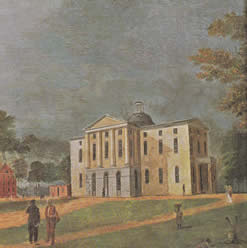
The North Carolina Constitution:
As noted elsewhere on this website, the State of North Carolina determined in convention assembled, to
peacefully withdraw from the political union it voluntarily joined in 1789, and then affiliate voluntarily with a new
political entity on 20 May 1861. It was no long part of the United States, and the allegiance of its citizens was
unquestionably to North Carolina. Facing immediate invasion from the North, and as the Constitution of 1776
did not address treason, an Amendment was added on 18 June 1861:
An Ordinance Defining Treason Against the State: Amendment to North Carolina Constitution,
read three times and passed 18 June 1861:
“Be it ordained that by this Convention, and it is hereby ordained by the authority of the same that follows:
Treason against the State of North Carolina, shall consist only of levying War against her, or in adhering to
her enemies; giving them aid and comfort. No person shall be convicted of Treason, unless on the Testimony
of two witnesses to the same overt act, or on confession in open Court.”
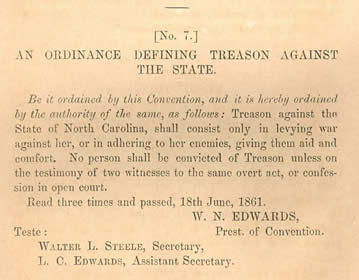
The United States and Confederate States Constitutions:
To further understand what constitutes a constitutional definition of treason, the following is presented:
The United States Constitution’s definition of treason (Article III, Section 3) states: “Treason against the
United States shall consist of levying War against them, or in adhering to their Enemies, giving them Aid and Comfort.”
The Confederate States Constitution’s definition of treason (Article III, Section 3) states: “Treason against the
Confederate States shall consist only of levying war against them, or in adhering to their Enemies, giving them
Aid and Comfort."
Both Constitution’s were identical in language, both defining treason as against an individual State,
not a federal or confederate government or nation. Note the word "them."
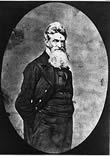
John Brown Executed for Treason Against Virginia:
As an example, John Brown was hung by the State of Virginia in October, 1859 after being tried on
a charge of treason against the Commonwealth of Virginia, his intent being the overthrow of Virginia’s government
and inciting rebellion within the State. His act of treason against Virginia was not an act of treason against the
other States, and did not involve the United States government except in assisting in Brown’s capture.
Colonial Examples:
Peter Mallet:
A Connecticut-born (1744-1805) merchant who in 1765 was purchasing African slaves on the
Guinea coast for transport and sale in the West Indies for large profits. He established himself as a commission
merchant at Edenton, and later to Wilmington where he became a prominent merchant by 1769. In 1775 he was
ordered by the Wilmington Committee of Safety to return Negro slaves he brought as this was in violation of
the Continental Association’s agreement to not accept British imports. During the British occupation of the State,
Cornwallis was supplied with provisions by Mallet and he freely moved behind British lines. In January 1782 he
surrendered to State authorities and was charged with and tried for treason against North Carolina.
Sergeant Thomas Peters:
A soldier in the British Black Pioneers, formerly a slave in the lower Cape Fear who
joined British forces in 1776 and fought against North Carolina independence – evacuated from New York to
Nova Scotia in 1783. In 1785 a ship from Nova Scotia docked in New Bern and when it was learned that many of the
seamen aboard had aided the enemy in the late war, the Legislature asked the governor to arrest them.
Governor Richard Caswell ordered the sheriff of Craven County to detain 10 of the crew for treason.
At Savannah in December, 1778, African slave Quamino Dolly acted as a guide for the British forces laying siege
to the city and led them through an unguarded passage to the rear of the American army. The garrison was caught
by complete surprise, routed, and lost half its number to death, drowning and capture.
The War Between the States:
LIncoln's Proconsul -- Edward Stanly:
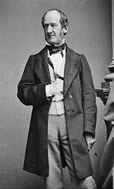
Diary Entry, June 12, 1862:
"[Edward] Stanly, the renegade, the traitor governor, appointed by Mr. Lincoln to rule his native State,
finds the way of the transgressor hard. He has stopped the Negro schools as being contrary to the
Statute Law of North Carolina, by which he has offended his Northern masters, but with a strange
inconsistency he ignores the fact (of which Mr. (George Edmund) Badger has reminded him however) that
his being here, as Gov, is as much an infringement on our rights, for the Laws of N.C. provide for an
election of the Gov by the people.
He said that if there was one man in N.C. whom he regarded more than another, one man whom he loved,
that man was Richard S. Donnell, & yet the first sight which greeted him on stepping ashore at New Berne
was the coffin of Mr. Donnell's mother with her name & the date of her birth & death cut on it, waiting shipment
to NY, her remains having been thrown out to give place to the body of a Yankee officer!
Such is our foe."
(Diary of a Secesh Lady)
Buffaloes: Thieves & Outlaws in Bertie County:
At least 805 Bertie Countians served honorably in defense of North Carolina during the War Between
the States; 63 would desert and adhere to the enemy. More than two hundred Bertie men would serve in
the First and Second Regiments North Carolina Union Volunteers, the equivalent of Tories serving the
British during the Revolution.
Upon the capture of Plymouth in 1863 by Major-General Robert F. Hoke of Lincolnton, twenty-two North Carolina
deserters found in Northern ranks were executed at Kinston. Many blue-clad North Carolinians captured at Plymouth
hid their identity and claimed to be assigned to other Northern regiments to escape execution – explaining how some
21 Bertie County men died at Andersonville. Author Thomas notes that “sufficient evidence exists that a number
of the [captured] North Carolinians “assumed the roles” of Northerners.”
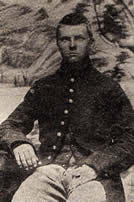
Charles Freeman of Bertie County enlisted in Company C, First Regiment North Carolina Union Volunteers,
mustered in as private on 23 July, 1862 at age eighteen. Many North Carolinians who defected to Northern forces
were said to have done so to escape Confederate military service and defense of their State; perhaps most adhered to
the enemy to protect their families and property in enemy-occupied North Carolina.
John B. Harrell, Zadock Morris, Benjamin F. Jones, Nazareth W. Parker and Isaac Parker were among the men
who went over to the enemy, as well as David, George and William Hoggard. It is claimed that these men wished
to avoid Confederate conscription, yet were willing to accept military service with the enemy.
Confederate deserter John “Jack” Fairless of Gates County organized, with the endorsement of Northern
authorities, a company of fellow deserters and draft-dodgers “who would become notorious for their renegade
activity.” Confederate military personnel and citizens in general scornfully referred to the men who served in
Fairless’s company, as well as those in other eastern North Carolina Union units, as “Buffaloes”; the term
became synonymous with “thieves” and “outlaws.”
“Even Union military leaders in the area held [Fairless] in low regard.…[and referred to them as]
“our home guard thieves.” Fairless was a habitual drunk and was shot dead by a deserter from the
Nineteenth North Carolina Regiment, James Wallace, on October 20 [1862].
Littleton Johnson, a deserter from the Thirty-second North Carolina Regiment contacted a Northern captain
to offer his services in organizing another regiment of North Carolina deserters to serve the enemy. Johnson had
by then already recruited William Thomas, John T. Cale, and William A. Lawrence. David Thompson deserted from
the Eleventh North Carolina Regiment in January 1863 to become a paid recruiting agent for the enemy at Plymouth.
He was paid 50 cents per day for his services and recruited a number of Bertie County slaves
for the Northern navy. (Thomas)

Many of General Robert F. Hoke’s 2400 prisoners after the battle at Plymouth were sent to
Andersonville in Georgia, the North Carolinians among them desperately claimed to be members of
Northern units – to avoid being hanged as deserters and traitors to their State and families.
Abandoning Every Principle of Patriotism:
“During [Hoke’s] unhappy retreat from New Bern, Pickett had happened to be near a group of the Union
soldiers captured during the campaign. An officer of the Sixth North Carolina remarked, “They belong to my
company.” Overhearing the comment, Pickett was enraged. He screamed, “You damned rascals, I’ll have
you shot, and all the damned rascals who desert.”
As the prisoners were led away, Pickett told those around him, “We’ll have a court martial on these fellows
pretty soon, and after some are shot, the rest will stop deserting.” Almost as soon as the retreat was over,
Pickett ordered a court-martial, composed of Virginia officers, to convene at Kinston. Twenty-two of the prisoners,
all members of the First and Second Regiments, North Carolina [Northern] Volunteers, were hurried
before the tribunal.
Charged with desertion, the men were convicted and sentenced to die by hanging. Pickett summarily approved
the death warrants, and Hoke was ordered to execute the sentences.
While awaiting their execution…..On February 5, Hoke requested that Chaplain Paris visit two deserters who
were destined to be the first hanged. Paris found the captives to be the “most hardened and unfeeling men I
ever encountered.” These two men, known as William Haddock and William Jones, were hanged publicly
in the presence of Confederate soldiers and civilians.
Over the course of the month, the other twenty condemned men were taken to the gallows. After all the
death sentences had been carried out, the chaplain deemed it appropriate to deliver a sermon about
the executions to Hoke’s brigade. In his discourse on Sunday, February 28,
Paris asked Hoke’s soldiers,
“But who were those twenty-two men whom you hanged upon the gallows? They were your fellow beings.
They were citizens of our own Carolina. They once marched under the same beautiful flag that waves
over our heads, but in an evil hour, they yielded to mischievous influences, and from motives or feelings
base and sordid, unmanly and vile, resolved to abandon every principle of patriotism, and sacrificed
ever impulse of honor, this sealed their ruin and enstamped their lasting disgrace.”
Hoke’s personal sentiments about the executions were manifested when Bryon McCullom called on the
general to seek an order for the body of his brother-in-law, in order to bury it. When Hoke asked if he wanted
to bury the executed man in a Yankee uniform, McCullom responded in the affirmative. Hoke then
expressed surprise that “so respectable a man would bury his brother-in-law in a Yankee uniform.”
(General Robert F. Hoke, Lee’s Modest General, pp. 120-122)
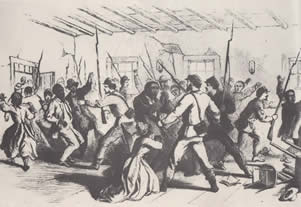
Seizing Slaves for the Military
Black Troops From North Carolina in Northern Regiments:
“In May, 1863 Federal military authorities at New Bern began organizing the First Regiment North Carolina
Colored Infantry. Twenty-seven Bertie County blacks enlisted in the new regiment [from] May 20 through May 28.
During May and June, thirty-three Bertie County blacks enlisted in the regiment, which was formally organized
in June 1863. Forty-three Bertie County blacks enlisted in the second “colored’ regiment between
June 24 and August 3.
Escape to an Uncertain Future
Black plantation hands and their families would often hear of the freedom offered by the enemy, just
as Lord Dumnore had proclaimed in his emancipation decree in 1775. Then, Negro slaves fled to British lines to
join them in fighting against the colonists independence; during the WBTS, some did the same in fleeing to
enemy ships who were only interested in infromation about North Carolina's defenses and military movements.
“The desertion of Negro slaves as “Intelligent Contrabands” by the [enemy's] coasting cruisers
formed an occasional incident in the records of their official logs; but it is a noteworthy fact,
deserving honorable mention, that comparatively few of the trusted Negroes upon whom the
Confederate Army relied for the protection and support of their families at home were thus found wanting.
A pathetic and fatal instance is recalled in the case of a misguided Negro family which put off from the
shore in the darkness, hoping that they would be picked up by a chance gunboat in the morning.
They were hailed by a cruiser at daylight, but in attempting to board her, their frail boat was swamped,
and the father alone was rescued, the mother and all the children perishing.”
(Chronicles of the Cape Fear, James Sprunt, Edwards & Broughton, 1916, p. 392)
Aiding and Adhering to the Enemy -- William B. Gould:
Born in 1837 to an Englishman and slave mother, Gould was raised on the Nicholas Nixon plantation
north of Wilmington and being trained as a plasterer by his owner, hired out to work on homes in town.
He worked on the Dr. John D. Bellamy home at the corner of Fifth and Market Streets in the late 1850s,
employed by the free black carpenters who regularly used slave labor for their construction crews.
In late September, 1862, Gould and seven other slaves left their homes and families and rowed down
the Cape Fear River and across the bar to an enemy blockading ship. He then enlisted in the Northern
navy, providing aid and guidance for intelligence gathering and raiding parties which attacked the
important North Carolina salt production facilities along the Cape Fear coast.
Nearby, Fort Fisher’s commander, Colonel William Lamb, was to find that his trusted slave Charles Wesley
fled to the enemy in May, 1864. Wesley provided invaluable information to the enemy regarding the fort's
construction, armament and troop strength, greatly undermining the defense
of the Cape Fear River and North Carolina. Gould remained in the North after the war,
and is buried in Dedham, Massachusetts in 1923.
Aiding and Adhering to the Enemy -- Abraham Galloway of Brunswick County:
Born a slave in Brunswick County, Abraham Galloway abandoned his family in 1857
and ended up in Ohio, where he would become “a militant abolitionist” (Evans, p. 110).
He returned to North Carolina in late 1862 with enemy troops, gathering information and
capturing slaves to serve in Northern regiments. Of this enemy occupation, “A lady in Elizabeth City
wrote in early 1863 that over two hundred Negroes daily went out “to maraud the country,” which
added greatly “to the terror and alarm of the women and children.”
After the war Galloway was located in New Bern, then moved to Wilmington in 1867 to
organize the Republican party through its large black population. He served as a delegate from
New Hanover County at the Raleigh constitutional convention in January 1868 that replaced
North Carolina’s historic constitution. Galloway’s contemporaries regarded him as being
“of exceedingly radical and Jacobinical spirit,” who “favored heavy taxation of large
estates." (Evans, pp. 110-11).
Historian Hamilton wrote of the 1868 Republican-majority General Assembly of which Galloway
was a part, that “The ignorance and prejudice of the majority of Republicans made them easy
prey for the corrupt minority of the party which at once assumed leadership in the body.
Venality was profitable and many who did not belong in such company were betrayed into
joining in the spoliation of the State.” (Hamilton, p. 349)
Galloway was also a strong supporter of Northern Gen. Milton S. Littlefield, a notorious postwar
carpetbagger and Union League leader who orchestrated fraudulent railroad bond schemes
which impoverished the already prostate State. The Raleigh Sentinel reported that when
Littlefield left North Carolina he had “in his possession as he departed $4,000,000 in State
bonds, the un-squandered portion of [the original] $7,000,000.”
The Radical Republican-dominated Reconstruction machine helped elect him as a State senator
in April 1868, and reelected him in 1870. That year he narrowly escaped an attempt on his life,
but died shortly thereafter of jaundice and bilious fever. The Wilmington Daily Journal wrote of
his death on 2 September 1870: “Mortuis nil nisi bonum,” “of the dead nothing but good.”
(Sources: Powell, Hamilton, Evans, Daniels)
High on the list of those North Carolinians who adhered to the enemy and waged war upon the State
was the infamous George W. Kirk, a murderous leader of fellow deserters and bushwhackers.
Born in Greene County, Tennessee, he enlisted in Confederate service but deserted at the first
opportunity and fled to the enemy. The corrupt Reconstruction Governor W.W. Holden later utilized
Kirk to suppress North Carolinians who resisted his bayonet rule.
Kirk’s Bushwhackers and Traitors
“My father was Captain Thomas Anderson Long, C.S.A. Near the end of the war he was stationed
at Camp Vance, near Morganton, in Western North Carolina, where he was serving as captain
in the commissary. He was captured there when this small post, a training camp for conscripts,
fell into the hands of Colonel Kirk and his band of guerillas. These men were a motley crew
from east Tennessee; among them deserters from both armies, whose god was plunder and
whose sport was murder; a dozen or so Cherokee Indians gave color and flavor to the outfit.
Kirk and his men came down stealthily through the mountain trails. The post was too weak to do
anything but capitulate. Loading his plunder on forty horses and mules, Kirk took his booty and his
prisoners and made a dash back to the mountains; but he was forced from time to time to fight off
pursuing squads of [Home Guard] men – old men and young men – who had collected quickly.
In these skirmishes it was Kirk’s practice to place the prisoners in his own front rank so they might
be killed unwittingly by their own comrades. He was heard to say,
“Look at the damn fools shooting their own men.”
Some of the prisoners were shot down, but my father was fortunate to escape unhurt.
When the prisoners had crossed the mountains and had reached the Tennessee River,
they were distributed to various prisons, the officers being sent to Johnson’s Island in Lake Erie.
[The prisoners] felt lucky to [be alive]…Kirk himself would probably have treated the prisoners
more harshly if the Union general in command at Knoxville had not placed a restraining hand on Kirk.
Kirk raided the Carolina mountains many times and in many directions. Women and children were
the worst sufferers. Many of the men were in the army, and in their absence the women folk did
even the plowing; when Kirk took their cows and pigs and chickens, there wasn’t much left to live on.
If you wished to see men in this region bristle, all you need do is mention the name Kirk.”
(Son of Carolina, Augustus White Long, Duke University Press, 1939, pp. 11-13)
Adhering to the Enemy -- Charles H. Foster at Murfreesboro
Charles H. Foster (1830-1882) was a native of Maine who in 1857 had become editor of the
Norfolk, Virginia “Southern Statesman,” a Democratic organ. At the end of 1859 he had purchased
the small Murfreesboro, North Carolina weekly, “The Citizen.” Elected an alternate to the Democratic
National Convention in Charleston in 1860, he also represented North Carolina at the Baltimore
convention that year. He championed the nomination of John C. Breckinridge.
In October 1860 Foster had a change of heart, sold The Citizen and applied for employment with
the US Post Office in Washington, and took a clerkship position in February 1861. Before leaving
North Carolina Foster had become a strong Union man who opposed the secession of the State,
probably to ensure his new federal government position. Returning to Murfreesboro in May 1861
to visit his wife and infant daughter, he was suspected of being
a Northern spy and forced to flee northward.
Back in Washington, Foster claimed to represent all Unionists in North Carolina and attempted to
gain a seat in the special session of Congress in July 1861. He “contrived a series of letters,
postmarked from various North Carolina towns, representing that Unionism was rife throughout
the State. The letters also publicized a “Unionist election” in North Carolina in August for
the purpose of sending representatives to Congress.”
Foster was absent from Washington in July and August to create the impression of returning to
his imaginary Unionist constituents, and then reappeared in September “bearing credentials attesting
to his election to Congress by the Unionists” of the State.
Unable to obtain elective office to represent enemy-occupied areas of northeastern North Carolina,
Foster eventually found work as a recruiting agent for the invading army. He raised most of the
so-called “First North Carolina Union Regiment,” and was appointed Lieutenant-Colonel of the
“Second North Carolina Volunteers. The latter position he held until banished from the
army for “inefficiency as an officer” and complaints to Washington. The recruitment of
North Carolina men was gained by threats of retaliation against their families and destruction
of their farms and property. Merchants were required to take oaths of allegiance to the
Northern government to keep their shops open, and fishermen required to
do the same to continue their occupation.
Foster returned to enemy-occupied Murfreesboro late in the war where he practiced law, dabbled
in Republican politics, and was an “erstwhile correspondent” for the New York Herald and other
papers. In 1878 he and his family relocated to Philadelphia.
(Dictionary of North Carolina Biography, William S. Powell,, 1986)
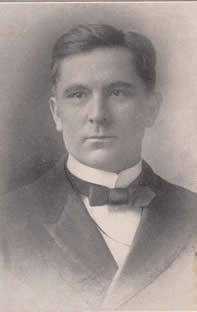
While a North Carolina State Legislator in 1902, future Governor Locke Craig debated North Carolina’s
Republican US Senator Jeter Pritchard at Charlotte and denounced the Republican practice
of rewarding those who had committed treason against North Carolina.
Republicans Rewarding Traitors with Pensions
[The Republicans complain that] two hundred thousand dollars went to pension the Confederate
soldiers. We will take care of these old veterans, we owe them a debt of gratitude. In the wreck
and ruin of war we were rich in the priceless heritage of their memory.
“These were men whom death could not terrify, whom defeat could not dishonor.” They glorified the fallen
cause by the simple manhood of their lives and by the heroism of their death. They have cast over
the South the glamour or an immortal chivalry and consecrated the cause of Dixie with the blood
of an immortal sacrifice. It was devotion like this that made the South, though torn and bleeding,
beautiful and splendid in her desolation, and in her woe.
For forty years they have been the builders of the New South and the projectors of her larger destiny.
The Federal Government provides for the soldiers that followed its flag. That is right. We will provide
for the soldiers of the armies of the “storm-cradled nation that fell.”
When Senator Pritchard was a member of the Legislature in 1895 he and his party voted against
giving one cent of pension to the needy heroes that had hobbled home on crutches from Appomattox.
There is one class of men whom we do not believe in pensioning – the deserter. There are men here
who remember the last two years of the war. The world was against us. Armies were crashing down
upon us like a ring of fire. Sherman was marching to the sea and leaving behind him ashes and desolation.
In that time there were men whose courage never faltered.
Ragged and hungry and bleeding they stood in the trenches around Richmond and Petersburg.
They stood with an unfailing devotion, though sometimes they knew that their little ones at home
were living on the corn they picked up from the wagon ruts of the invading armies. They died
remembering Dixie like the Greeks remembering Argos – in the language of the old song:
“While one kissed a ringlet of thin gray hair and one kissed a lock of brown.”
But there were some who did not stand. Traitors and deserters they were. They turned their backs upon
the only home and country that they ever had. They sneaked through the lines. They threw away their
old gray uniform and put on the blue. They came back to shoot and kill, to rob the defenseless wives
and mothers of their comrades who were fighting and dying at the front; to burn their homes
and to murder the innocent.
To these men Senator Pritchard has given a royal pension. He said to the hero of the Confederacy
that he might starve, but with the money of the honest people he feeds and clothes the deserter.
Yes, I denounce this in the name of the forty thousand sons of North Carolina who sleep tonight
beneath the sod in the battle-scarred bosom of old Virginia. I denounce it in the name of the men
who rushed defiant of death through the storm of Chickamauga and Gettysburg. In the name of
every Confederate soldier I denounce it. In memory of the women who were robbed and the
men who were murdered I denounce it. In the name of all brave men who love courage and
despise cowardice, who believe in fidelity to comrades and in love for home and in loyalty to
a great cause, I denounce this infamous act. I do not stand alone.
Here is the resolution of the last Reunion of Confederate Veterans of North Carolina:
“Resolved, That we condemn and denounce the Act of Congress which rewards treachery and perfidy
in giving pensions to Confederate deserters for fighting against their former flag and comrades.”
The judgment of the South is that the party that starves the soldier and pensions
the deserter should be accursed forever."
(Speech (excerpt) of Hon. Locke Craig, Joint Debate with Sen. Jeter Pritchard, October 9, 1902,
Memoirs and Speeches of Locke Craig, Hackney & Moale Company, 1923, pp. 85-88)
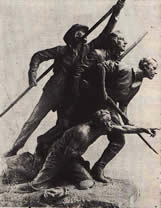
Sources:
Dictionary of North Carolina Biography, William S. Powell, 1986
The Black Experience in Revolutionary North Carolina, Jeffrey Crow
The Savannah, Thomas L. Stokes
General Robert F. Hoke, Lee's Modest Warrior, D.W. Barefoot, 1996
Divided Allegiances, Bertie County During the Civil War, Gerald W. Thomas
Reconstruction in North Carolina, Joseph DeR. Hamilton, 1914
Ballots and Fence Rails, W. McKee Evans, UGA Press, 1995
Prince of Carpetbaggers, Jonathan Daniels, J.B. Lippincott, 1958
Copyright 2012 North Carolina War Between the States Sesquicentennial Commission